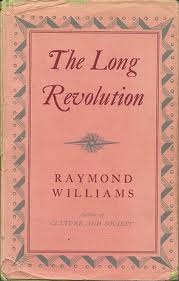 First edition | |
| Author | Raymond Williams |
|---|---|
| Language | English |
| Genre | Cultural studies |
| Publisher | Chatto & Windus |
Publication date | 1961 |
| Media type | Print (book) |
| ISBN | 0-14-020762-7 |
| OCLC | 12448133 |
The Long Revolution is a 1961 book by Raymond Williams. The "long revolution" of the title is a revolution in culture, which Williams sees as having unfolded alongside the democratic revolution and the industrial revolution. It followed on from Culture and Society, which was his first widely read work.
With this book, Williams led the way in recognizing the importance of the growth of the popular press, the growth of standard English, and the growth of the reading public in English-speaking culture and in Western culture as a whole. In addition, Williams' discussion of how culture is to be defined and analyzed has been of considerable importance in the development of cultural studies as an independent discipline.
"Raymond Williams’ new book... develops the important themes of Culture & Society—the study of the theory of culture, and an analysis of the stage reached in the development of a “common culture”...
"I am released from the usual inhibitions upon a socialist reviewer—the need to repair the hostility of the general press. I have no need to insist upon the importance of Raymond Williams’ achievement. Even a brief passage of his writing has something about it which demands attention—a sense of stubborn, unfashionable integrity, a combination of distinction and force. His work, over the past ten years, carries an authority which commands the respect of his opponents; and the positions which he has occupied must be negotiated by critics and by historians, by educational theorists, by sociologists and by political theorists.
"This is to say that his work is very important indeed, and that—so far as we can speak of a New Left—he is our best man." [1]
" Raymond Williams, whose other works include Keywords, The Country and the City, Culture and Society, and Modern Tragedy, was one of the world’s foremost cultural critics. Almost uniquely, his work bridged the divides between aesthetic and socio-economic inquiry, between Marxist thought and mainstream liberal thought, and between the modern and post-modern world.
"When The Long Revolution first appeared in 1961, much of the acclaim it received was based on its prescriptions for Britain in the ’60s, which form a relatively brief final section of the whole. The body of the book has since come to be recognized as one of the foundation documents in the cultural analysis of English-speaking culture. The “long revolution” of the title is a cultural revolution, which Williams sees as having unfolded alongside the democratic revolution and the industrial revolution." [2]
References
- ^ [1] Review by Edward Thompson, 1961,
- ^ Broadview Press.
 First edition | |
| Author | Raymond Williams |
|---|---|
| Language | English |
| Genre | Cultural studies |
| Publisher | Chatto & Windus |
Publication date | 1961 |
| Media type | Print (book) |
| ISBN | 0-14-020762-7 |
| OCLC | 12448133 |
The Long Revolution is a 1961 book by Raymond Williams. The "long revolution" of the title is a revolution in culture, which Williams sees as having unfolded alongside the democratic revolution and the industrial revolution. It followed on from Culture and Society, which was his first widely read work.
With this book, Williams led the way in recognizing the importance of the growth of the popular press, the growth of standard English, and the growth of the reading public in English-speaking culture and in Western culture as a whole. In addition, Williams' discussion of how culture is to be defined and analyzed has been of considerable importance in the development of cultural studies as an independent discipline.
"Raymond Williams’ new book... develops the important themes of Culture & Society—the study of the theory of culture, and an analysis of the stage reached in the development of a “common culture”...
"I am released from the usual inhibitions upon a socialist reviewer—the need to repair the hostility of the general press. I have no need to insist upon the importance of Raymond Williams’ achievement. Even a brief passage of his writing has something about it which demands attention—a sense of stubborn, unfashionable integrity, a combination of distinction and force. His work, over the past ten years, carries an authority which commands the respect of his opponents; and the positions which he has occupied must be negotiated by critics and by historians, by educational theorists, by sociologists and by political theorists.
"This is to say that his work is very important indeed, and that—so far as we can speak of a New Left—he is our best man." [1]
" Raymond Williams, whose other works include Keywords, The Country and the City, Culture and Society, and Modern Tragedy, was one of the world’s foremost cultural critics. Almost uniquely, his work bridged the divides between aesthetic and socio-economic inquiry, between Marxist thought and mainstream liberal thought, and between the modern and post-modern world.
"When The Long Revolution first appeared in 1961, much of the acclaim it received was based on its prescriptions for Britain in the ’60s, which form a relatively brief final section of the whole. The body of the book has since come to be recognized as one of the foundation documents in the cultural analysis of English-speaking culture. The “long revolution” of the title is a cultural revolution, which Williams sees as having unfolded alongside the democratic revolution and the industrial revolution." [2]
References
- ^ [1] Review by Edward Thompson, 1961,
- ^ Broadview Press.